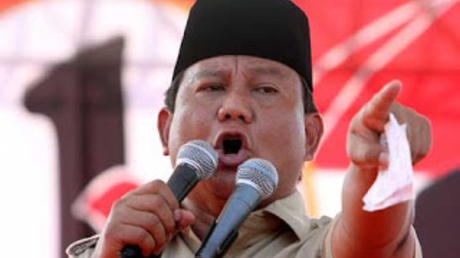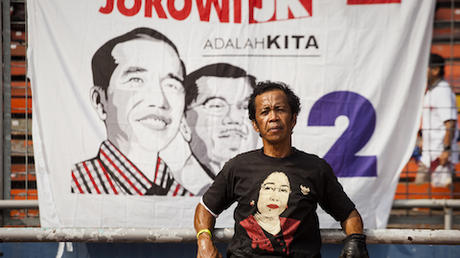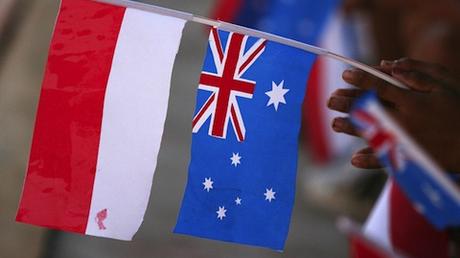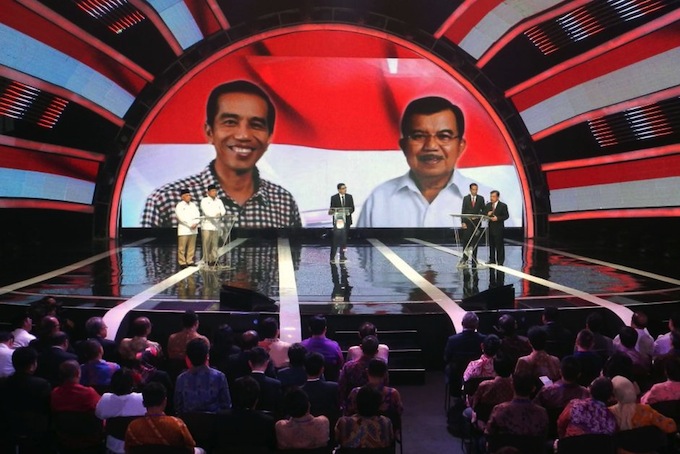Joko Widodo was the winner in Monday night's first presidential debate, in what has become a close and polarising race with rival candidate Prabowo Subianto.
Belying widespread expectations that former general Prabowo would prove the more polished TV performer, the popular Jakarta Governor “Jokowi” was able to push his credentials as a politician who listens to the everyday person, one of the most important reasons that people support him.
At the outset of the debate, Jokowi defined democracy as “listening to the people's voice and implementing it”, a statement replayed repeatedly on pro-Jokowi news channel Metro TV the next day. He also took full advantage of the free-kick handed to him when Prabowo asked if he would end direct elections of district heads, saying the polls would continue as an expression of the people's sovereignty.
Where Prabowo squandered his only opportunity to ask his opponent a direct question, Jokowi's politically seasoned deputy Jusuf Kalla used their question to spotlight Prabowo's chequered human rights past.
Although Prabowo had a response prepared to Kalla's thinly veiled reference to his involvement in kidnapping pro-democracy activists during the last days of his then father-in-law Suharto’s rule, the question clearly made him uncomfortable, and his answer did little to put the issue to rest.
For anyone watching closely, the debate also further exposed Prabowo's lack of commitment to democracy.
In particular, Prabowo's punchline - that it was for his military superiors to judge his conduct, and that if Kalla wanted to know their view he would need to ask them - almost invited the media to continue to pursue comment from the panel of generals that recommended in 1998 that Prabowo be discharged from the military, as it has been doing for the past week.
Although there is not clear evidence that his human rights past costs Prabowo many votes, his camp's annoyance was clear in the subsequent labelling of Kalla's question as 'cheap' by Prabowo's chief apologist and prominent campaign team member Fadli Zon.
For anyone watching closely, the debate also further exposed Prabowo's lack of commitment to democracy. Where Jokowi chose a populist description of democracy as listening to the people, Prabowo commented that the people still need to learn to use their vote responsibly. He again indicated his preference for the original version of the 1945 Constitution, which predates the four amendments made to underpin Indonesia's current democratic order. He also implied through his question to Jokowi that he supports ending the direct election of local leaders, a position his deputy Hatta Radjasa felt the need to contradict.
Jokowi's one notable stumble came in a meandering answer devoid of substance to the innocuous question of whether he could critically evaluate the current government's programs, and decide which to maintain and which to discontinue. It was an answer that would have played into one of the Prabowo campaign's key lines of attack against Jokowi, that he is not ready to govern the country, having never held a national level position. Despite this stumble, Jokowi's camp should be happy with his overall debate performance.
For all of that, we simply don't know how big a contribution this debate - or the four scheduled to follow - will make to the July 9 election's outcome. But in a campaign where the popular Jokowi's television appearances have oscillated between the witty and convincing and the very poor, his performance on this occasion will have left the Prabowo camp with more homework to do before the next debate on the economy and social welfare this Sunday night.
Dr Dave McRae will be one of the speakers in a special Election Watch/Centre for Indonesian Law, Islam and Society/Electoral Regulation Research Network event scheduled on July 2: Indonesia's Presidential Elections - What Happens Next? For information or to register, please click here.





